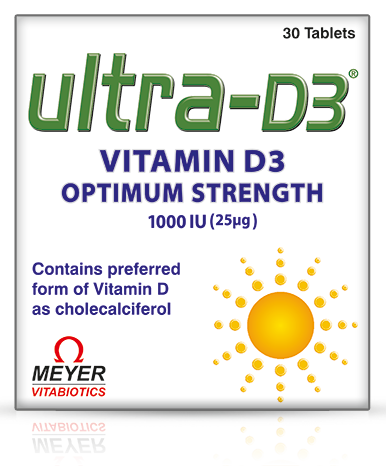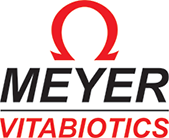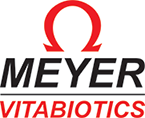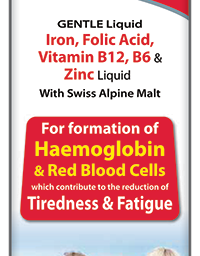
Safe, Simple & Essential
Optimum strength vitamin D which plays a truly remarkable role in the body and is important for many areas of health. It not only contributes to the maintenance of normal bones and teeth but is also known for its role in supporting normal function of the immune system, normal cell division and normal muscle function.
Optimum Strength Vitamin D formula
Provides optimum strength vitamin D which plays a truly remarkable role in the body and is important for many areas of health. It not only contributes to the maintenance of normal bones and teeth but is also known for its role in supporting normal function of the immune system, normal cell division and normal muscle function.
Vitamin D is synthesized by the body on exposure to sunlight, however many people are now following health advice to avoid too much sun exposure, which reduces vitamin D levels in the body.
What is Vitamin D?
Vitamin D is a fat soluble vitamin found in foods such as oily fish, butter and egg yolk. It is formed through the action of UV sunlight on the skin.
Vitamin D has functions and benefits that are probably more wide ranging than any other vitamin. There has been huge renewed interest in vitamin D recently, with new global research showing that the health benefits of this nutrient stretch beyond bone health.
There is increasing evidence for the beneficial effects from dietary Vitamin D which has shown benefits for its contribution to:
• Maintenance of normal bones and teeth
• Normal absorption and utilisation of calcium and phosphorus
• Normal muscle function
• Normal blood calcium levels
• Normal function of the immune system
• The process of cell division
D3 the preferred bioactive form
Provides effective levels of the preferred form of vitamin D3 (cholecalciferol). Provides optimum level Pharmacopoeia Quality Vitamin D3. D3 is the preferred form of vitamin D because it is the specific form made in the human body and therefore more effective than D2 which is found in some supplements.
Vitamin D – the sunshine vitamin
While our bodies manufacture Vitamin D on exposure to sunshine, the levels in many countries is so weak during the winter months that our body makes little or no Vitamin D at all, meaning that dietary supplements are often the best way to safeguard intakes of Vitamin D. Many populations, including the majority of those in Europe, require an additional dietary source of Vitamin D to achieve and maintain an adequate status of Vitamin D throughout the year.
In addition, the body does not generate Vitamin D when sitting behind a glass window, whether in your car or at home, because these UV rays cannot penetrate glass to generate Vitamin D in the skin. Sunscreens, even weak ones, while essential to protect the skin, can affect the body’s ability to generate vital Vitamin D.
Vitamin D in the diet and health benefits
Vitamin D is naturally present in some foods (e.g. oily fish such as herring, sardines, fish liver oils, eggs, butter) and in a few foods that are fortified with Vitamin D (e.g. .margarine, some cereals, some yoghurts). Vitamin D is fat soluble, therefore advice to eat lower fat diets may contribute to reduced intakes from foods and hence dietary supplementation may be needed. In the UK the background diet provides 3-4 ug /day of Vitamin D and only a little more if oily fish is consumed.
There are a number of reasons why Vitamin D supplementation is now advocated. These include:
• Government health advice to reduce sun exposure which can mean less Vitamin D is produced naturally by the body.
• Reduced sun exposure in certain groups of the population e.g. older people, for religious reasons/clothing, certain occupations, medical reasons, those with dark skin (as greater skin melanin content can reduce the skin’s ability to produce Vitamin D).
• Increased requirement at certain life stages e.g. the elderly population – whose skin may not be able to synthesize Vitamin D effectively.
• Those with increased dietary intolerances (e.g. lactose and dairy), allergens.
• People who are on a diet.
Always read the product directions before use. Do not exceed the recommended intake. As with other food supplements seek professional advice before using if you are pregnant, breastfeeding or suffer from food allergies, and consult your doctor or pharmacist if you have an underlying medical condition or if on medication. Food supplements are not intended to treat or prevent any disease. Food supplements must not replace a balanced and varied diet, and a healthy lifestyle.
Each film coated tablet contains:
Vitamin D3 I.P. (as stabilized) 1000 IU (25 µg)
Pack: 30’s tablets
One tablet daily or as directed by the Physician.
1. For Maintenance of Vitamin D levels
2. Borderline Cases of Diabetes & Cardiovascular diseases
3. Childrens 6 years & above
4. Pregnancy & Lactation
– Prevention of PIH
– Prevention of gestational diabetes
– Pre & Post Menopause








